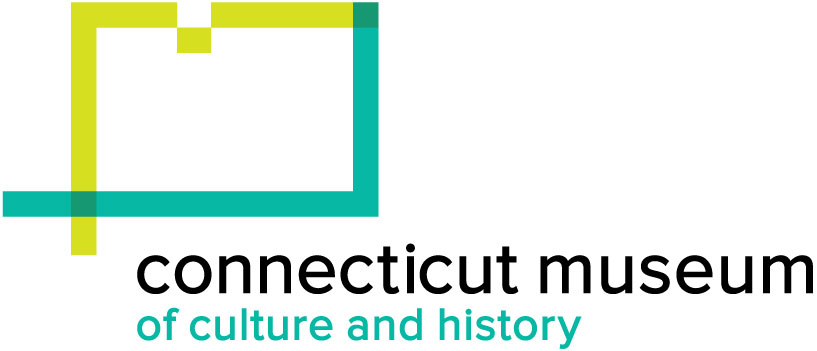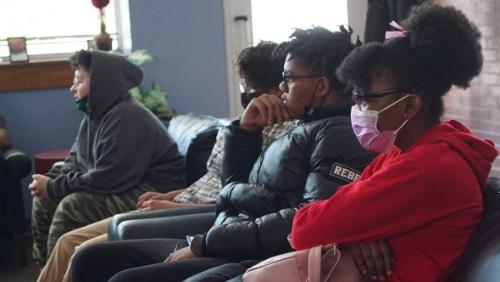Interview with Blue Hills Civic Association Members
InterviewerInterviewed by
Samariya Smith
InterviewerInterviewed by
Peter Moran
Date2022 February 26
Mediumborn digital audio file
DimensionsDuration: 53 Minutes, 28 Seconds
ClassificationsInformation Artifacts
Credit LineCommunity History Project Collection
Object number2022.20.1a-b
Description(a) Interview with four members of the Blue Hills Civic Association: Asia Hamilton, Jenallice "EJ" Alers, Carlos Ortiz, and Elijah Kerr. Interviewed by Samariya Smith and Peter Moran on February 26, 2022 at the Blue Hills Civic Association Office, 410 Homestead Ave., Hartford. (b) Photograph of the group taken at the interview. They were interviewed as part of the Connecticut Historical Society's Community History Project discussing their experience during the COVID-19 Pandemic.
The participants interviewed were high school students between the ages of 15-17. When asked about the impact of COVID-19 in their lives, they reported that it negatively affected the way their teachers interacted with them, particularly regarding mask enforcement. It also affected the way they interacted with their peers and the people around them. The students reported that teachers got Covid more often than students. The students attributed this to teachers not obeying mask and distancing mandates themselves, despite demanding compliance from students. They felt this behavior was frustrating and hypocritical.
The students were supportive of mask mandates and expressed concern about the upcoming removal of mandates. They felt the school administration was trying to appease parents who opposed mandates when masks helped.
Additionally, the quality of their education plummeted. They reported online learning was not successful during the pandemic. Many students did not have computers and the school did not have enough to distribute, and many students were left behind. Teachers hardly assigned any work, and the students were easily distracted at home. When the students returned to class, they said that the constant use of substitute teachers impaired the quality of their education, and the substitutes were unable to help them when they needed it. While the students reported that they didn’t necessarily want to attend school, they felt like the learned more in-person than remote.
One student also reported that food was an issue during the pandemic. At school, students got their meals for free. With many people now at home at the same time under the same roof, food went very quickly.
A couple of the students expressed that they didn’t feel the lockdowns helped. One mentioned she felt that the lockdowns caused greater poverty by not distributing resources equitably which “dug the hole deeper.”
When asked what they did for fun during the pandemic, the students responded that their sources of entertainment were social media, video games, and board games with family, respectively.
When asked about mental health in their community, they responded that most people around them were opposed to therapy, preferring to deal with their problems themselves. They believed the rise of violence in their communities was largely due to the pandemic. Many people, already lacking resources, lost their jobs due to the lockdowns, exacerbating poverty. Regarding people their age, one student responded that school was an escape for many young people whose home environments were unsafe.
Regarding vaccines, their responses were mixed but generally opposed. Several students noted that their parents opposed it but were forced to receive the vaccine due to their jobs. One student expressed frustration over the mandates because their parents wouldn’t let them get the vaccine and were unable to attend an educational event due to being unvaccinated. They agreed that the vaccines didn’t work and didn’t understand the mandates when most people got Covid regardless of vaccination status.
The students felt they lost their social life and their interests. One student described it as like the Great Depression. Several students said they matured during the pandemic, but one student said he felt that his peers grew up too fast. The words they used to describe the pandemic were eye-opening, toxic, and traumatizing. The greatest lesson they learned was to be careful what you wish for and the difference between idealism and realism. Their advice for those experiencing future pandemics was to think positively, prioritize yourself and your needs, listen to your parents, and to learn new hobbies, and to take it seriously.
The participants interviewed were high school students between the ages of 15-17. When asked about the impact of COVID-19 in their lives, they reported that it negatively affected the way their teachers interacted with them, particularly regarding mask enforcement. It also affected the way they interacted with their peers and the people around them. The students reported that teachers got Covid more often than students. The students attributed this to teachers not obeying mask and distancing mandates themselves, despite demanding compliance from students. They felt this behavior was frustrating and hypocritical.
The students were supportive of mask mandates and expressed concern about the upcoming removal of mandates. They felt the school administration was trying to appease parents who opposed mandates when masks helped.
Additionally, the quality of their education plummeted. They reported online learning was not successful during the pandemic. Many students did not have computers and the school did not have enough to distribute, and many students were left behind. Teachers hardly assigned any work, and the students were easily distracted at home. When the students returned to class, they said that the constant use of substitute teachers impaired the quality of their education, and the substitutes were unable to help them when they needed it. While the students reported that they didn’t necessarily want to attend school, they felt like the learned more in-person than remote.
One student also reported that food was an issue during the pandemic. At school, students got their meals for free. With many people now at home at the same time under the same roof, food went very quickly.
A couple of the students expressed that they didn’t feel the lockdowns helped. One mentioned she felt that the lockdowns caused greater poverty by not distributing resources equitably which “dug the hole deeper.”
When asked what they did for fun during the pandemic, the students responded that their sources of entertainment were social media, video games, and board games with family, respectively.
When asked about mental health in their community, they responded that most people around them were opposed to therapy, preferring to deal with their problems themselves. They believed the rise of violence in their communities was largely due to the pandemic. Many people, already lacking resources, lost their jobs due to the lockdowns, exacerbating poverty. Regarding people their age, one student responded that school was an escape for many young people whose home environments were unsafe.
Regarding vaccines, their responses were mixed but generally opposed. Several students noted that their parents opposed it but were forced to receive the vaccine due to their jobs. One student expressed frustration over the mandates because their parents wouldn’t let them get the vaccine and were unable to attend an educational event due to being unvaccinated. They agreed that the vaccines didn’t work and didn’t understand the mandates when most people got Covid regardless of vaccination status.
The students felt they lost their social life and their interests. One student described it as like the Great Depression. Several students said they matured during the pandemic, but one student said he felt that his peers grew up too fast. The words they used to describe the pandemic were eye-opening, toxic, and traumatizing. The greatest lesson they learned was to be careful what you wish for and the difference between idealism and realism. Their advice for those experiencing future pandemics was to think positively, prioritize yourself and your needs, listen to your parents, and to learn new hobbies, and to take it seriously.
Label TextListen to interview at http://hdl.handle.net/11134/40002:19646604
NotesSubject Note: The Connecticut Historical Society’s Community History Project (CHP) is a public-facing initiative, focused on contemporary collecting, gathering items of the recent past as well as from events happening today. This program developed community historians to identify, document, and preserve their experiences as residents of Connecticut, and to share these experiences during a series of community presentations. The project focused on the impact of Covid-19 on Connecticans, particularly on Black and Brown communities, funeral homes, and on nursing home and elder care populations.Cataloging Note: This cataloging project was made possible in part by the Institute of Museum and Library Services MA-249472-OMS-21.
Status
Not on view2022 June 8
2022 June 8
2022 December 5







